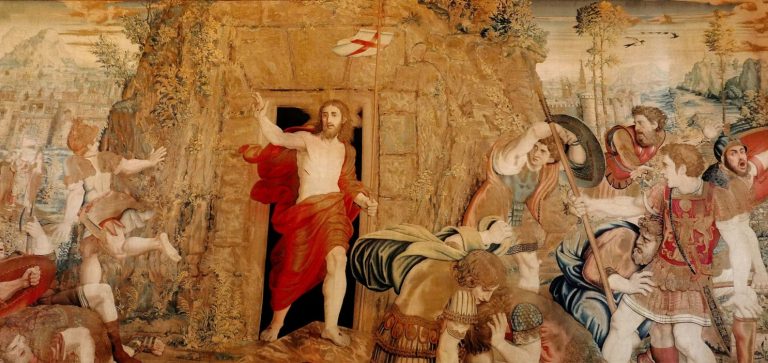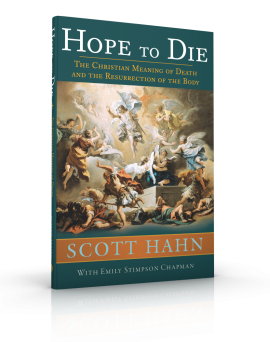By Scott Hahn
Dr. Scott Hahn is the best-selling author of over forty books, including Hope to Die: The Christian Meaning of Death and the Resurrection of the Body. He is the founder and president of the St. Paul Center and holds the Fr. Michael Scanlan Chair of Biblical Theology and the New Evangelization at Franciscan University.

In death, the divide between hope and fear is unbridgeable. Each of the waiting dead knows what will happen to them at the time of the Final Judgment. They know if their body will be resurrected to death or to life. Those who hope, hope with certainty. Those who fear, fear with equal certainty. They all know what they freely chose in life—heaven or hell—and they know the time for making another choice has passed. Christ the Judge has pronounced their fate, and that fate is sealed.
But here and now, the chasm between hope and fear can be crossed. We don’t have to dread the end of this earthly life. We don’t have to live in terror about what comes after we close our eyes for the last time. No matter how far we’ve run from God, no matter how often we’ve chosen against him and his ways, we still have time to make another choice. Like the Prodigal Son, we can return to the Father’s house and know that he will welcome us with open arms, transforming our fear of death into hope for life.
The fear so many of us feel in the face of death is, of course, natural. We weren’t made for death. We were made for life.
But Jesus came to release us from our fear of death. The loving obedience he offered on the cross atoned for our sins and opened the gates to Heaven for all who follow him. But it also changed the very meaning of death for those united to him. It “transformed the curse of death into a blessing,” making death the door that leads to everlasting life with God (CCC 1009).
That is to say, for those who die in Christ’s grace, death isn’t a solitary act; it’s “a participation in the death of the Lord,” and when we die with the Lord, we also rise with the Lord; we participate in his resurrection (CCC 1006).
This participation changes everything. The Church’s liturgy reminds us of this. “Lord, for your faithful people life is changed, not ended,” we hear the priest say at funeral Masses. “When the body of our earthly dwelling lies in death we gain an everlasting dwelling place in heaven.” When we know death is not the end, when we know that death is just the beginning of everlasting joy, everlasting life, and everlasting communion with the One we love, hope drives out fear. It makes us long for death. It makes us long to be with Christ in a world where there is no suffering, no pain, no loss.
Knowing death is not the end also makes us long for something else. It makes us long to share our hope with others.
The world tells us to eat, drink, and make merry, for tomorrow we may die. The world sees death as the end, with only darkness to follow. The Church, however, tells us to love, sacrifice, serve, and pray, so that tomorrow we might live. It sees death not so much as an end, but as a beginning, and urges us to both remain in Christ’s grace and ask him for the graces to do so.
You Might Also Like
In Hope to Die: The Christian Meaning of Death and the Resurrection of the Body, Scott Hahn explores the significance of death and burial from a Catholic perspective. The promise of the bodily resurrection brings into focus the need for the dignified care of our bodies at the hour of death. Unpacking both Scripture and Catholic teaching, Hope to Die reminds us that we are destined for glorification on the last day.


